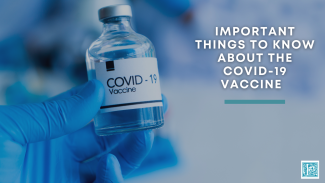
Important Things to Know About the COVID-19 Vaccine
With the U.S. Centers for Disease Control (CDC) recently announcing that fully vaccinated individuals no longer needed to wear a mask to protect against COVID-19 (unless local guidelines require otherwise), many are more committed than ever to getting this vaccine and moving on with normal life.[1] Read on for four things everyone should know about the COVID-19 vaccines: Pfizer, Johnson & Johnson, and Moderna.[2]
The Vaccine is Free
According to the CDC, COVID-19 vaccine providers cannot charge you for the vaccine itself or for any co-pays, administration fees, or other vaccine-related costs.[3] Unless you had any other medical procedures at the same time or on the same visit you received your COVID vaccine, you cannot be charged for an office visit. You also can't be denied the vaccine just because you don't have health insurance or are out of network.
Sign Up at Vaccines.gov
Although vaccines are administered on a state-by-state basis, you can sign up for a vaccine appointment in your area through www.vaccines.gov.[4] You can also call 1-800-232-0233, text your zip code to 438829, or contact your State Health Department to find locations and appointment times that are convenient for you. Many vaccines are administered through pharmacies, so you can also check directly with the pharmacies in your area to see whether they're offering COVID vaccines and, if so, which type of vaccine you can get if you go there.
Not All Vaccines are Right for Everyone
Each of the COVID-19 vaccines currently being used in the U.S. are a little different. The Pfizer and Moderna vaccines are RNA-based and require two injections, given about a month apart.[5] The Johnson & Johnson vaccine is a viral vector vaccine, and requires only one shot.[6] But because the J&J vaccine was briefly paused after some recipients experienced blood clots, those with a history or high risk of blood clots may need to avoid this vaccine.[7] If you have allergies or any medical conditions, it's a good idea to talk to your doctor or pharmacist to see which vaccine will likely be the best fit for you.
Two Weeks to Full Protection
It takes your immune system about two weeks to mount a full response to the COVID-19 vaccine.[8] While there is some protection conferred after the first shot (for those getting Pfizer or Moderna), you are not considered "fully vaccinated" until two weeks after your final shot.[9] Continue to take precautions like socially distancing and masking up while you wait for this time to pass.
[1] https://www.cdc.gov/coronavirus/2019-ncov/vaccines/fully-vaccinated.html
[2] https://www.ama-assn.org/delivering-care/public-health/what-doctors-wish-patients-knew-about-johnson-johnson-vaccine
[3] https://www.cdc.gov/coronavirus/2019-ncov/vaccines/keythingstoknow.html
[4] https://www.cdc.gov/coronavirus/2019-ncov/vaccines/How-Do-I-Get-a-COVID-19-Vaccine.html
[5] https://www.yalemedicine.org/news/covid-19-vaccine-comparison
[6] https://www.ama-assn.org/delivering-care/public-health/what-doctors-wish-patients-knew-about-johnson-johnson-vaccine
[7] https://www.bbc.com/news/world-us-canada-56733715
[8] https://www.cdc.gov/coronavirus/2019-ncov/vaccines/keythingstoknow.html
[9] https://www.cdc.gov/coronavirus/2019-ncov/vaccines/fully-vaccinated.html
Sources
https://www.bbc.com/news/world-us-canada-56733715
https://www.ama-assn.org/delivering-care/public-health/what-doctors-wish-patients-knew-about-johnson-johnson-vaccine
https://www.cdc.gov/coronavirus/2019-ncov/vaccines/fully-vaccinated.html
LPL Tracking #1-05153844

